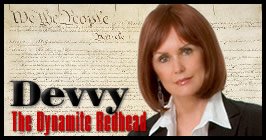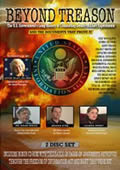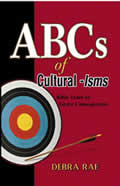Other
Devvy
Articles:
Vote Fraud: What They Aren't Telling You
Forced Mental Health Screening for Your Children
CIRCUIT
COURT JUDGE IMPEACHMENT UNDERWAY IN MARYLAND
PART 2 of 2
By: Devvy
February 20, 2006
NewsWithViews.com
Knowledge is power. Unfortunately, and I'm borrowing a wonderful phrase here from a very intelligent friend of mine, Sherry Jackson, too many Americans are allergic to reading. But, more and more Americans are turning to the Internet to learn the genesis of problems and finding solutions. If you are unfamiliar with the subject matter in Part I, specifically judges, the courts (see here and here), jurisdiction, states rights and separation of powers, below is a fine discussion paper from a dedicated American in the State of Indiana.
A Brief Discussion of:
The Judge David Hamilton v. Indiana Legislature Ruling
Prepared
By: Ed Sparks
7 January 2006
Indianapolis, Indiana
Executive Summary:
"Following the recent release of the decision reached in the case of Judge David Hamilton v. Indiana Legislature I began an investigation to determine if that Court possessed the authority to judge the actions of the Indiana Legislature in the matter addressed. It seems that for the last 188 years a preacher of some randomly selected denomination has opened each session of the Legislature with a prayer. The Judge reached the decision that that opening prayer was unconstitutional and issued orders to the legislature as to how it should operate its opening sessions.
"My investigations revealed that this order issued by the local federal Court (Southern District of Indiana) is illegal. The federal lower Courts are created by Congress by authority invested in that body from the federal Constitution under Article I, Section 8, Clause 9. Congress is also given the right to limit all laws and facts that the Supreme Court can hear under Article III, Section 2, Clause 2. Finally Article I, Section 8, Clause 18 (The Necessary and Proper Clause) empowers Congress to organize the supreme judicial branch. This last gives Congress the authority to organize both the lower Courts and any special courts needed, such as the bankruptcy Courts.
"Congress is prohibited by the First Amendment to the Constitution from "issuing any law respecting an establishment of religion, or prohibiting the free exercise thereof." Since Congress is explicitly prohibited from addressing religion and in that it may not delegate any power that it does not possess, the Courts created by Congress are also prohibited from addressing religious matters in any manner. The decision issued by Judge David Hamilton against the Indiana Legislature is illegal. It is unconstitutional
The
Brief
Judge David Hamilton v. the Indiana Legislature
"Recently Judge David Hamilton (District of Southern Indiana) issued a decision that the prayer offered by various preachers to open each session of the Indiana Legislature was unconstitutional.
The First Amendment statement regarding religion is simple and concise. It states:
"Congress shall make no law respecting an establishment of religion, or prohibiting the free exercise therof; ."
"With this statement the First Amendment to the Federal Constitution prohibits Congress, and only Congress, from either establishing a religion or interfering with the practice of any religion in this country. This is a directed amendment and is a limit upon the federal Congressional creation of laws that would either create a state religion or interfere with the practice of religion in this country. It is a clear enhancement and a direct protection of State's rights. This Amendment clearly forbids Congress from entering into any regulation of the freedom of religion in this country. As such, any regulation of religion is left to the states as detailed in the Tenth Amendment. The First Amendment is a "states rights" Amendment.
"The lower federal Courts are created by Congress under Article 1, Section 8, Clause 9. That Clause states: "The Congress shall have Power To; .constitute Tribunals inferior to the supreme Court ."
"Under this Article the lower Courts are created by Congress and are subject to the same Constitutional limitations that affect and/or limit Congress. As so limited by the First Amendment (as Congress itself is limited) those inferior Courts may not interfere with the practice of religion in this country, in any way. "Congress may not delegate a power that it does not possess.
"In 1793 the Supreme Court overstepped this limit when it affirmed the argument of Atty. General Randolph in Chisholm v. Georgia, 2 U.S. 419 (1793). In so doing it accepted his argument (and made law) that where Congress is silent, federal courts can establish "procedure prevails" by virtue of the Supremacy Clause (Article VI, Clause 2). This is a Court precedence under which Justice Hamilton's ruling falls.
"This argument has prevailed in the Courts for over two hundred years despite other parts of the Constitution that contradicts this ruling and that were ignored by the Court when it reached this conclusion. While this case involved a citizen of one state suing a citizen of another state it involved the creation of new law by the Court just as Justice Hamilton's ruling creates new law.
"Article VI, Clause 2 of the Constitution states: "This Constitution, and the Laws of the United States which shall be made in Pursuance thereof; and all treaties made, or which shall be made, under the Authority of the United States, shall be the supreme Law of the Land; and Judges in every State shall be bound thereby, any Thing in the Constitution or Laws of any State to the Contrary notwithstanding."
"There are two points to be considered here. The first is obvious and applies in this instance. In this matter Congress has issued no limiting instructions to the Courts. It is silent, and has thus failed to firmly establish the same limits on the Courts as are established upon Congress by the First Amendment. In the Justice Hamilton decision the First Amendment is the highest law in the land and the Court should need no limiting instructions. The Courts, under this clause, have ignored Article 1, Section 8, Clause 2, have seized upon this Congressional failure and used its absence to extend its reach into an area, the practice of religion, where it should not go.
"Again, Congress is prohibited from either establishing a religion or interfering with the practice of any religion. Congress cannot delegate the authority to do so to either the Supreme Court or to the lower Courts. It does not possess that authority.
"The second and the most important point: By the First Amendment Congress is expressly prohibited from establishing a religion or interfering with the practice of any religion in this country. Congress may not address either action as it so affects the states or the citizens therein. Therefore to comply with the Constitution it is forced to remain silent but only where it affects the various states or the citizens. This silence is not required where it can certainly limit the Courts transgression. For whatever reason, Congress has chosen not to act to limit the Courts and the Courts have chosen to construe this silence as giving to them the right to venture into those areas where Congress is clearly forbidden to enter. Congress must correct this omission.
"The Court has long ignored this Constitutional limitation placed upon the Congress.
"In Reynolds vs. the United States (1879) the Supreme Court confronted a federal law banning polygamy in the territories and the Court ruled protecting the belief but not the action. In this decision the Court overstepped its authority when it even ruled in this case, again a place where Congress is prohibited from addressing. Congress remained silent and the ruling was not overturned. Congress should have exercised its oversight ability, stepped in, negated the decision and removed the case and the subject from judicial view. It did not do so.
The Lower Federal Courts:
"Again the Constitution speaks: In the Necessary and Proper Clause (Article I, Section 8, Clause 18) Congress is empowered to organize the supreme judicial branch. It is, thus, undeniable that Congress is given the power by the Constitution to limit the power of the Courts.
"That clause states: "The Congress shall have Power To; .make all Laws which shall be necessary and proper for carrying into Execution the foregoing Powers, and all other Powers vested by this Constitution in the Government of the United States, or in any Department or Officer thereof."
"It is in this clause that we find the source of our special courts, the admiralty, the bankruptcy, or diversity cases, and these are but examples of the breadth of the special, limited courts that Congress may enable.
"If the Congress can both limit the law and cases that the Supreme Court can hear and can set up special limited courts then it can certainly limit any lower Court under the powers given to it under the Constitution. Again, see Article 1, Section 8, Clause 9.
"In this instance it has been shown, herein, that Congress does not possess the power to interfere with the practice of religion, a power that the local Court has assumed. Congress is limited, cannot delegate, and has not delegated, that power to the Courts. The lower Courts have assumed the power, have acted as a Legislature, and Congress has remained silent.
The Supreme Court:
"At yet another place in the Constitution (Article III, Section 2, Clause 2) we find that Congress is directly empowered to limit both the law and the cases that the Supreme Court shall hear.
"That Article states: "In all the other Cases before mentioned, the Supreme Court shall have appellate Jurisdiction, both as to Law and Fact, with such Exceptions, and under such Regulations as the Congress shall make."
"That statement, coupled with the previously listed Article I, allows Congress to place any law or case beyond the reach of the Supreme Court when and if it so desires. If it can so control the actions of the Supreme Court then it can certainly control the actions of any lower Federal Court as stated above. Congress has been silent and as such has so defaulted.
States Rights:
"In this Brief I have shown that both the Supreme Court and the lower Federal Courts have limitations placed upon them through the direct limits placed upon Congress by the federal Constitution. There is yet a second limitation.
"Each state Legislature operates within the confines of that states' Constitution. Each state Constitution lays the groundwork rules by which each legislature conducts its business within the State House and within its chambers. By its very existence, each state Constitution places a barrier between the state Legislature and the federal government, the federal judiciary and the direct actions of Congress. Congress alone recognizes the State and provides for its entrance into the Union through its own Legislative action.
"If the federal judiciary wants to address any State Legislature and question the legality of its actions it is prohibited from doing so by the existence of each State Constitution. The State Legislature cannot serve two masters. It serves the State Constitution or it serves the federal Constitution. It cannot serve both. Each State Legislatorial freedom was recognized behind the protection of the Tenth Amendment and the Congressional legislation that recognized the individual State. In accepting each State into the Union the federal government, as represented by Congress, recognized the independence of each State and that each State operated behind the protection inherent in that States Constitution.
"For Judge Hamilton to deliver a decision ordering the Indiana State Legislature to change its operation in direct violation of its own Constitution is a direct violation of the independence and individual autonomy granted each state by the federal government at the time of its admission into the Union. That State Constitution stands as a mighty wall between the individual state government and any branch of the federal government. That wall cannot be broached by the actions of a lower federal Court.
Conclusion:
"Since Congress may not delegate a power it does not possess, and that the local Federal Court (District of Southern Indiana) is a creation of Congress, this local lower federal Court has exceeded its delegated authority and, properly, has no jurisdiction in this case. It, the local Court, is prohibited by the federal Constitution, through its direct Congressional limitations that includes the Tenth and the Fourteenth Amendment, from hearing or taking any action in the matter of prayers opening each session of the Legislature. In fact, Congress itself is opened at each session by a prayer. Safely hidden behind its own Constitution, the State and the State Legislature is safe from federal Court encroachment.
"Since the Court is thus prohibited from taking any action against federal citizens protected by the First Amendment, the Hamilton v. Indiana Legislature ruling is illegal, unconstitutional and invalid.
"The Indiana Legislature should have rejected, out of hand, this ruling and continued its opening prayers exactly as it has been doing for the last 188 years. It should expect no punishment and will receive none if it chooses to do so. Congress is prohibited by the First Amendment from assigning a punishment for this Court-defined offense as is every federal agency set up by this Congress. In 1812 Massachusetts chose to disregard the federal request for troops to fight in the War of 1812. Its action was ignored.
"Instead of rejecting the lower Courts action the Indiana Legislators modified its 188 year tradition and its members stood instead together for a 20 second time of silence before the Legislature was opened. We could have hoped for better action than to have our representatives cower before this lower Court and its obvious unconstitutional action. It is safe to assume that no federal marshals would show up to take over the Indiana Legislature if the leadership had chosen to ignore the local federal Courts decision.
"Congress, at some time, must address this practice of the lower federal Court to overstep its limitation. It might as well be now.
"In this country the Constitution is the cap, the limit, of all our federal laws. If we allow the Courts to rule in matters like this, where there is clear Constitutional limitation on their right to do so, we no longer have a rule by law but rule by man. To preserve our legal system the Judge Hamilton ruling must be overturned. If it is not overturned then this two-hundred year experiment in freedom is finished."
Click here for part -----> 1
� 2006 Devvy Kidd - All Rights Reserved
Devvy Kidd authored the booklets, Why A Bankrupt America and Blind Loyalty, which sold close to 2,000,000 copies. Devvy appears on radio shows all over the country, ran for Congress and is a highly sought after public speaker. Your complimentary copy of the 32-page report may be obtained from El Dorado Gold. Devvy is a contributing writer for www.NewsWithViews.com.
Devvy's website: www.devvy.com
E-mail is: devvyk@earthlink.net
"For Judge Hamilton to deliver a decision ordering the Indiana State Legislature
to change its operation in direct violation of its own Constitution is
a direct violation of the independence and individual autonomy granted
each state by the federal government...














